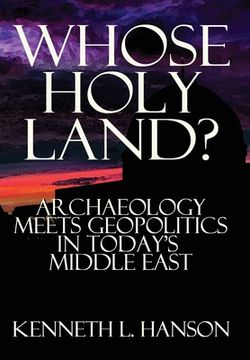Whose Holy Land?: Archaeology Meets Geopolitics in Today's Middle East (en Inglés)
Reseña del libro "Whose Holy Land?: Archaeology Meets Geopolitics in Today's Middle East (en Inglés)"
Biblical Archaeology is more than just an obscure field for academics. It's a modern mine field, with implications that may well determine the course of future events for the Middle East and the entire world. Ancient artifacts are more than just museum pieces--they're the storytellers, witnesses to the truth of who lived in this ancient land and when. Archaeology is ultimately about history, and history is the raison d'être for Jews living in this land at all. Whose Holy Land? gathers archaeological evidence for the Jewish presence in Jerusalem and environs extending back into the Bronze Age during the twentieth century B.C.E. The Canaanites have of course disappeared, as has the entire lineage of the ancient Romans and Byzantines. There are no Egyptians (only Arab tribes who conquered the land of the pharaohs), no Babylonians, no Assyrians, no Edomites, Hittites or Amalekites; and the list goes on. Of all ancient peoples, only the Jews have survived. Yet, it is precisely the Jews who are said to be squatters on Arab land.History tells us that those who identify as modern "Palestinians" are in fact the remnants of sundry Arab tribes living under the Ottoman Turks, who lost the land to the British in 1917. The Ottomans took it from the Mamluks, who took it from the Ayyubids, who took it from the Crusaders, who took it from the Seljuks, who took it from the Fatimids, who took it from the Abbasids, who took it from the Byzantines and Romans, who took it from the Jews. This is exactly what the archaeological record also reveals. It's time to take a fresh look at the modern implications of the science of archaeology.

